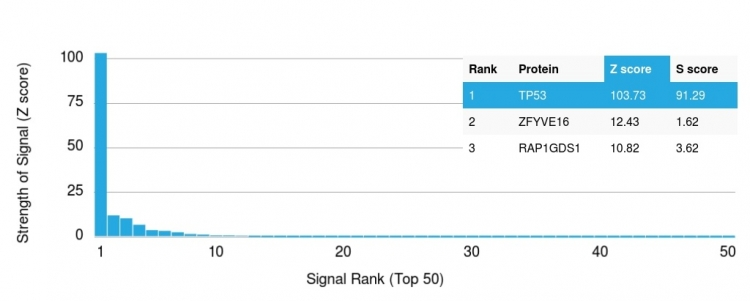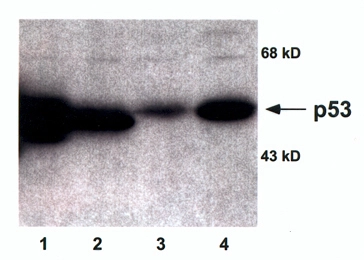![IHC-P analysis of human colon carcinoma tissue using GTX17698 p53 antibody [TP53/2092R]. IHC-P analysis of human colon carcinoma tissue using GTX17698 p53 antibody [TP53/2092R].](https://www.genetex.com/upload/website/prouct_img/normal/GTX17698/GTX17698_20200115_IHC-P_496_w_23060620_160.webp)
IHC-P analysis of human colon carcinoma tissue using GTX17698 p53 antibody [TP53/2092R].
p53 antibody [TP53/2092R]
GTX17698
ApplicationsWestern Blot, ImmunoHistoChemistry, ImmunoHistoChemistry Paraffin, Other Application
Product group Antibodies
TargetTP53
Overview
- SupplierGeneTex
- Product Namep53 antibody [TP53/2092R]
- Delivery Days Customer9
- Application Supplier NoteWB: 1-2microg/ml. IHC-P: 1-2microg/ml for 30 minutes at RT. *Optimal dilutions/concentrations should be determined by the researcher.Not tested in other applications.
- ApplicationsWestern Blot, ImmunoHistoChemistry, ImmunoHistoChemistry Paraffin, Other Application
- CertificationResearch Use Only
- ClonalityMonoclonal
- Clone IDTP53/2092R
- Concentration0.2 mg/ml
- ConjugateUnconjugated
- Gene ID7157
- Target nameTP53
- Target descriptiontumor protein p53
- Target synonymsBCC7, BMFS5, LFS1, P53, TRP53, cellular tumor antigen p53, antigen NY-CO-13, mutant tumor protein 53, phosphoprotein p53, transformation-related protein 53, tumor protein 53, tumor supressor p53
- HostRabbit
- IsotypeIgG
- Protein IDP04637
- Protein NameCellular tumor antigen p53
- Scientific DescriptionThis gene encodes a tumor suppressor protein containing transcriptional activation, DNA binding, and oligomerization domains. The encoded protein responds to diverse cellular stresses to regulate expression of target genes, thereby inducing cell cycle arrest, apoptosis, senescence, DNA repair, or changes in metabolism. Mutations in this gene are associated with a variety of human cancers, including hereditary cancers such as Li-Fraumeni syndrome. Alternative splicing of this gene and the use of alternate promoters result in multiple transcript variants and isoforms. Additional isoforms have also been shown to result from the use of alternate translation initiation codons from identical transcript variants (PMIDs: 12032546, 20937277). [provided by RefSeq, Dec 2016]
- Storage Instruction-20°C or -80°C,2°C to 8°C
- UNSPSC12352203


![WB analysis of HeLa cell lysate using GTX17698 p53 antibody [TP53/2092R]. WB analysis of HeLa cell lysate using GTX17698 p53 antibody [TP53/2092R].](https://www.genetex.com/upload/website/prouct_img/normal/GTX17698/GTX17698_20200115_WB_129_w_23060620_779.webp)


![IHC-P analysis of human breast carcinoma tissue using GTX17818 p53 antibody [rTP53/1739].](https://www.genetex.com/upload/website/prouct_img/normal/GTX17818/GTX17818_20200115_IHC-P_387_w_23060620_474.webp)
![IHC-P analysis of human colon carcinoma tissue using GTX18091 p53 antibody [PCRP-TP53-1F7].](https://www.genetex.com/upload/website/prouct_img/normal/GTX18091/GTX18091_20200115_IHC-P_490_w_23060620_250.webp)
![IHC-P analysis of human colon carcinoma tissue using GTX18125 p53 antibody [PCRP-TP53-2A10].](https://www.genetex.com/upload/website/prouct_img/normal/GTX18125/GTX18125_20200115_IHC-P_491_w_23060620_881.webp)